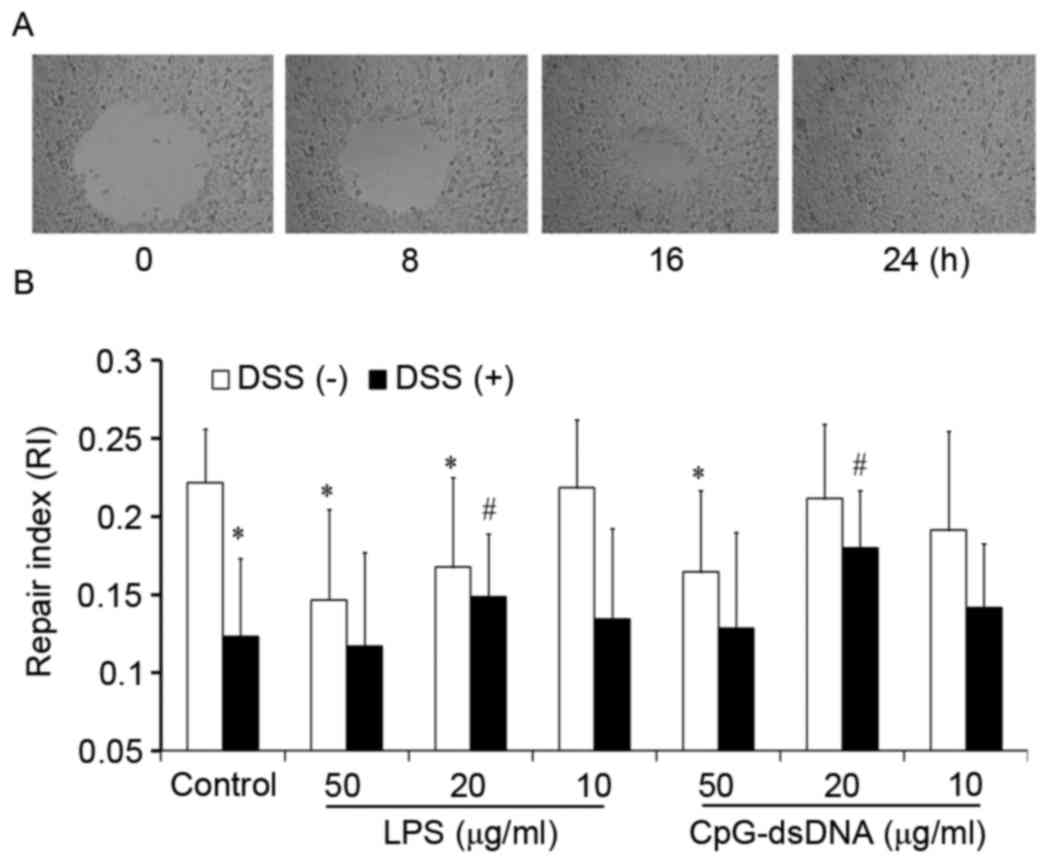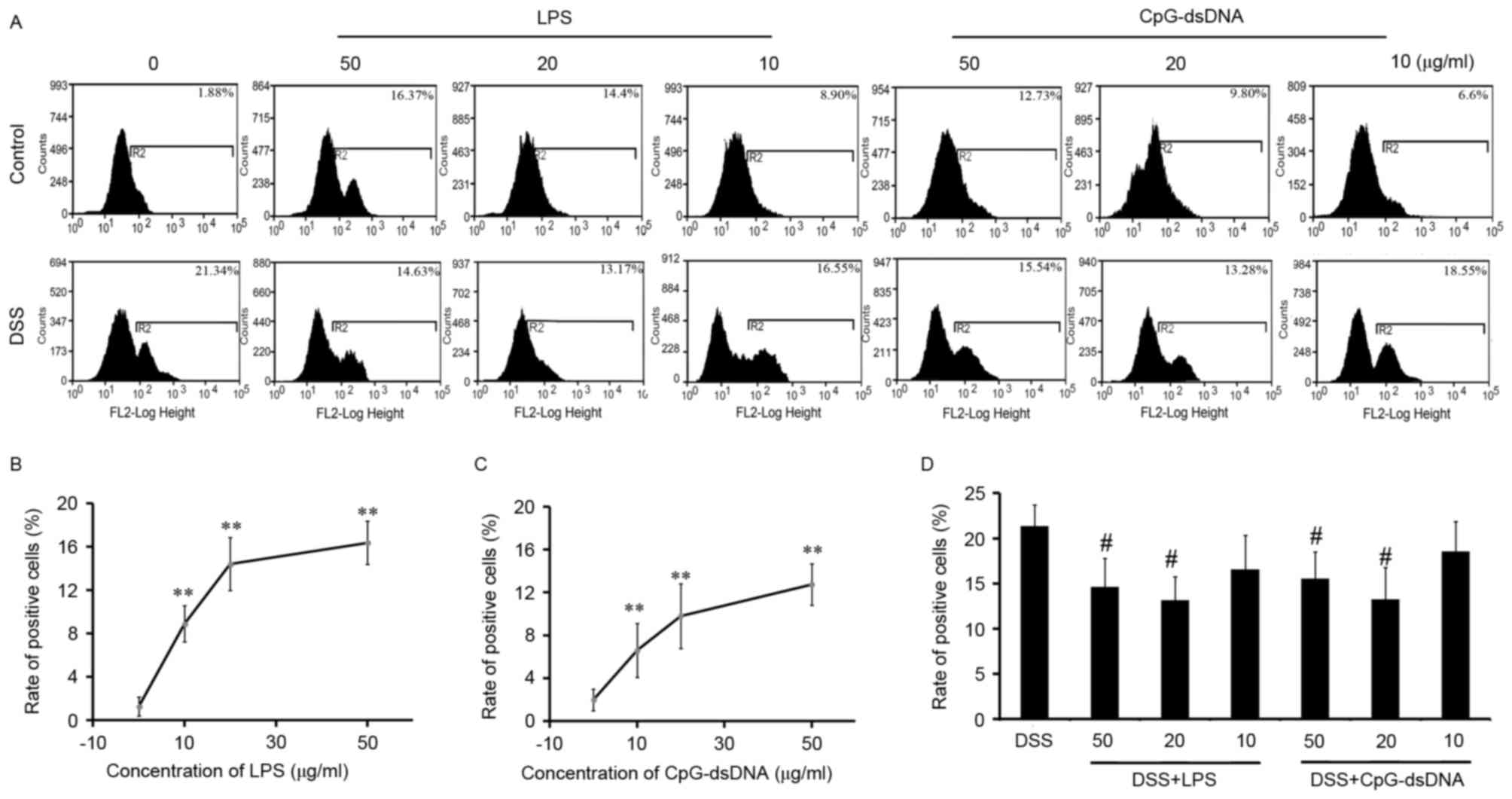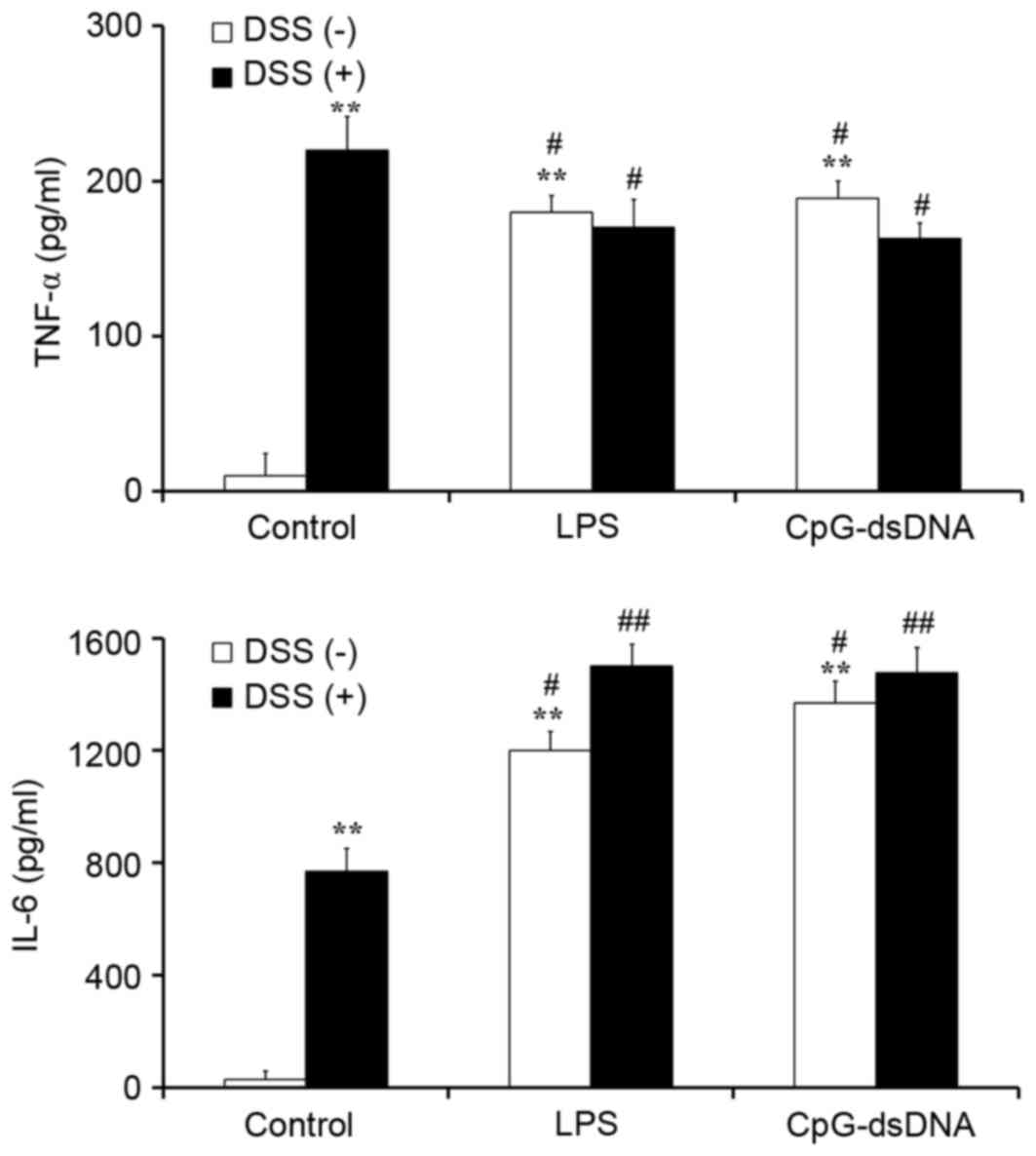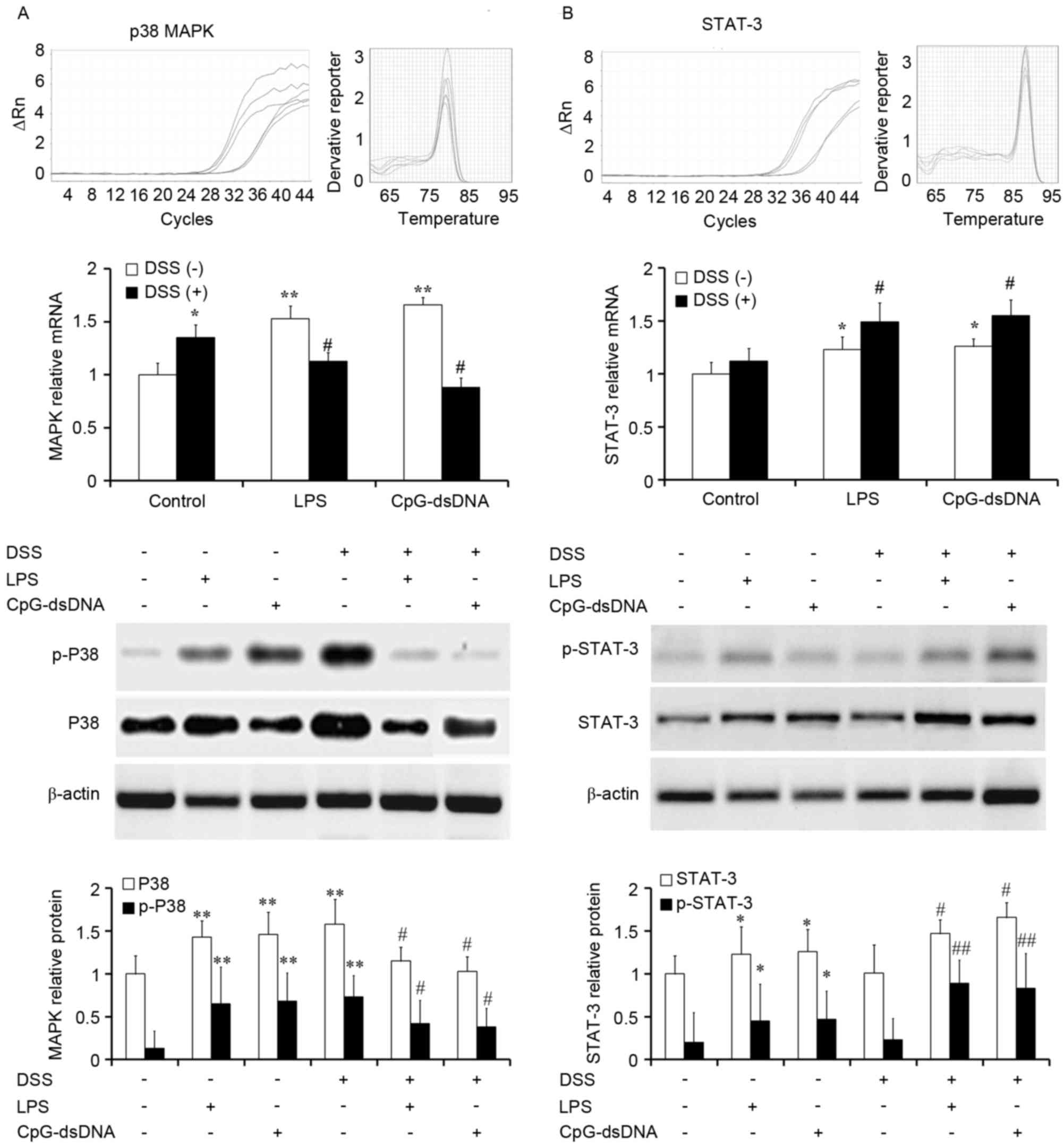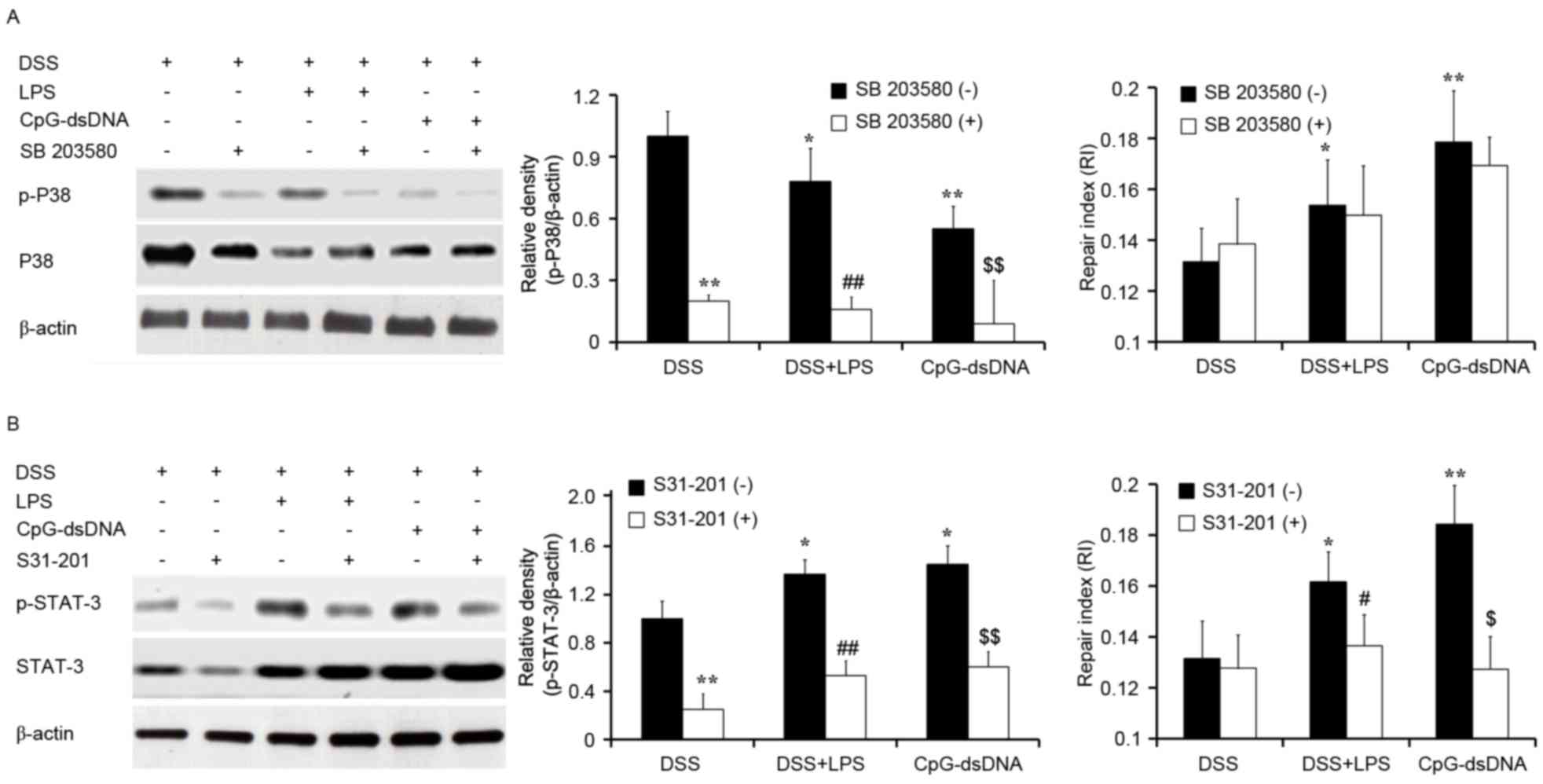|
1
|
de Mattos BR, Garcia MP, Nogueira JB,
Paiatto LN, Albuquerque CG, Souza CL, Fernandes LG, Tamashiro WM
and Simioni PU: Inflammatory bowel disease: An overview of immune
mechanisms and biological treatments. Mediators Inflamm.
2015:4930122015. View Article : Google Scholar : PubMed/NCBI
|
|
2
|
Chassaing B, Koren O, Carvalho FA, Ley RE
and Gewirtz AT: AIEC pathobiont instigates chronic colitis in
susceptible hosts by altering microbiota composition. Gut.
63:1069–1080. 2014. View Article : Google Scholar : PubMed/NCBI
|
|
3
|
Sahay B, Ge Y, Colliou N, Zadeh M, Weiner
C, Mila A, Owen JL and Mohamadzadeh M: Advancing the use of
Lactobacillus acidophilus surface layer protein A for the treatment
of intestinal disorders in humans. Gut Microbes. 6:392–397. 2015.
View Article : Google Scholar : PubMed/NCBI
|
|
4
|
Zhu J, Wang Y, Yang F, Sang L, Zhai J, Li
S, Li Y, Wang D, Lu C and Sun X: IL-33 alleviates DSS-induced
chronic colitis in C57BL/6 mice colon lamina propria by suppressing
Th17 cell response as well as Th1 cell response. Int
mmunopharmacol. 29:846–853. 2015. View Article : Google Scholar
|
|
5
|
Smyth K, Garcia K, Sun Z, Tuo W and Xiao
Z: TLR agonists are highly effective at eliciting functional memory
CTLs of effector memory phenotype in peptide immunization. Int
Immunopharmacol. 15:67–72. 2013. View Article : Google Scholar : PubMed/NCBI
|
|
6
|
Saito K, Katakura K, Suzuki R, Suzuki T
and Ohira H: Modulating Toll-like receptor 4 signaling pathway
protects mice from experimental colitis. Fukushima J Med Sci.
59:81–88. 2013. View Article : Google Scholar : PubMed/NCBI
|
|
7
|
Berkowitz D, Peri R, Lavy A and Kessel A:
Increased Toll-like receptor 9 expression by B cells from
inflammatory bowel disease patients. Hum Immunol. 74:1519–1523.
2013. View Article : Google Scholar : PubMed/NCBI
|
|
8
|
Koguchi Y, Buenafe AC, Thauland TJ,
Gardell JL, Bivins-Smith ER, Jacoby DB, Slifka MK and Parker DC:
Preformed CD40L is stored in Th1, Th2, Th17, and T follicular
helper cells as well as CD4+ 8-thymocytes and invariant
NKT cells but not in Treg cells. PLoS One. 7:e312962012. View Article : Google Scholar : PubMed/NCBI
|
|
9
|
Iezzi G, Sonderegger I, Ampenberger F,
Schmitz N, Marsland BJ and Kopf M: CD40-CD40L cross-talk integrates
strong antigenic signals and microbial stimuli to induce
development of IL-17-producing CD4+ T cells. Proc Natl
Acad Sci USA. 106:876–881. 2009. View Article : Google Scholar : PubMed/NCBI
|
|
10
|
Senhaji N, Kojok K, Darif Y, Fadainia C
and Zaid Y: The contribution of CD40/CD40L axis in inflammatory
bowel disease: An update. Front Immunol. 6:5292015. View Article : Google Scholar : PubMed/NCBI
|
|
11
|
Borcherding F, Nitschke M, Hundorfean G,
Rupp J, von Smolinski D, Bieber K, van Kooten C, Lehnert H,
Fellermann K and Büning J: The CD40-CD40L pathway contributes to
the proinflammatory function of intestinal epithelial cells in
inflammatory bowel disease. Am J Pathol. 176:1816–1827. 2010.
View Article : Google Scholar : PubMed/NCBI
|
|
12
|
Arranz A, Reinsch C, Papadakis KA,
Dieckmann A, Rauchhaus U, Androulidaki A, Zacharioudaki V,
Margioris AN, Tsatsanis C and Panzner S: Treatment of experimental
murine colitis with CD40 antisense oligonucleotides delivered in
amphoteric liposomes. J Control Release. 165:163–172. 2013.
View Article : Google Scholar : PubMed/NCBI
|
|
13
|
Gao D, Wagner AH, Fankhaenel S, Stojanovic
T, Schweyer S, Panzner S and Hecker M: CD40 antisense
oligonucleotide inhibition of trinitrobenzene sulphonic acid
induced rat colitis. Gut. 54:70–77. 2005. View Article : Google Scholar : PubMed/NCBI
|
|
14
|
Lee JW, Wang P, Kattah MG, Youssef S,
Steinman L, DeFea K and Straus DS: Differential regulation of
chemokines by IL-17 in colonic epithelial cells. J Immunol.
181:6536–6545. 2008. View Article : Google Scholar : PubMed/NCBI
|
|
15
|
Ng HP, Burris RL and Nagarajan S:
Attenuated atherosclerotic lesions in apoE-Fcγ-chain-deficient
hyperlipidemic mouse model is associated with inhibition of Th17
cells and promotion of regulatory T cells. J Immunol.
187:6082–6093. 2011. View Article : Google Scholar : PubMed/NCBI
|
|
16
|
Tan YR, Qi MM, Qin XQ, Xiang Y, Li X, Wang
Y, Qu F, Liu HJ and Zhang JS: Wound repair and proliferation of
bronchial epithelial cells enhanced by bombesin receptor subtype 3
activation. Peptides. 27:1852–1858. 2006. View Article : Google Scholar : PubMed/NCBI
|
|
17
|
Livak KJ and Schmittgen TD: Analysis of
relative gene expression data using real-time quantitative PCR and
the 2(−Delta Delta C(T)) method. Methods. 25:402–408. 2001.
View Article : Google Scholar : PubMed/NCBI
|
|
18
|
Frosali S, Pagliari D, Gambassi G,
Landolfi R, Pandolfi F and Cianci R: How the intricate interaction
among toll-like receptors, microbiota and intestinal immunity can
influence gastrointestinal pathology. J Immunol Res.
2015:4898212015. View Article : Google Scholar : PubMed/NCBI
|
|
19
|
Buttó LF, Schaubeck M and Haller D:
Mechanisms of microbe-host interaction in Crohn's disease:
Dysbiosis vs. Pathobiont selection. Front Immunol. 6:5552015.
View Article : Google Scholar : PubMed/NCBI
|
|
20
|
Wang L, Wu G, Qin X, Ma Q, Zhou Y, Liu S
and Tan Y: Expression of nodal on bronchial epithelial cells
influenced by lung microbes through DNA methylation modulates the
differentiation of T-Helper cells. Cell Physiol Biochem.
37:2012–2022. 2015. View Article : Google Scholar : PubMed/NCBI
|
|
21
|
Greene JA, Portillo JA, Corcino Y Lopez
and Subauste CS: CD40-TRAF signaling upregulates CX3CL1 and TNF-α
in human aortic endothelial cells but not in retinal endothelial
cells. PLoS One. 10:e01441332015. View Article : Google Scholar : PubMed/NCBI
|
|
22
|
Wang W, Bai L, Qiao H, Lu Y, Yang L, Zhang
J, Lin R, Ren F, Zhang J and Ji M: The protective effect of
fenofibrate against TNF-α-induced CD40 expression through
SIRT1-mediated deacetylation of NF-κB in endothelial cells.
Inflammation. 37:177–185. 2014. View Article : Google Scholar : PubMed/NCBI
|
|
23
|
Seibold K and Ehrenschwender M: p62
regulates CD40-mediated NFκB activation in macrophages through
interaction with TRAF6. Biochem Biophys Res Commun. 464:330–335.
2015. View Article : Google Scholar : PubMed/NCBI
|
|
24
|
Chakraborty S, Srivastava A, Jha MK, Nair
A, Pandey SP, Srivastava N, Kumari S, Singh S, Krishnasastry MV and
Saha B: Inhibition of CD40-induced N-Ras activation reduces
leishmania major infection. J Immunol. 194:3852–3860. 2015.
View Article : Google Scholar : PubMed/NCBI
|















